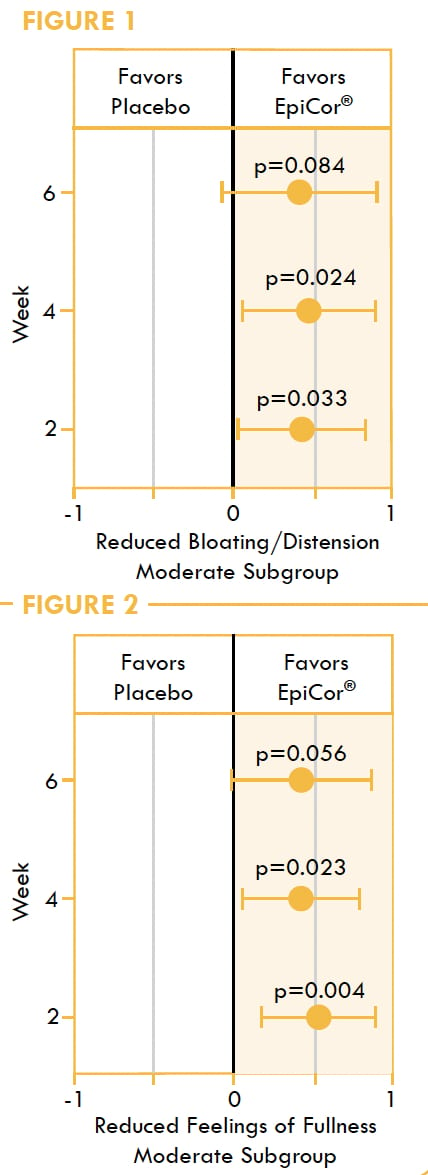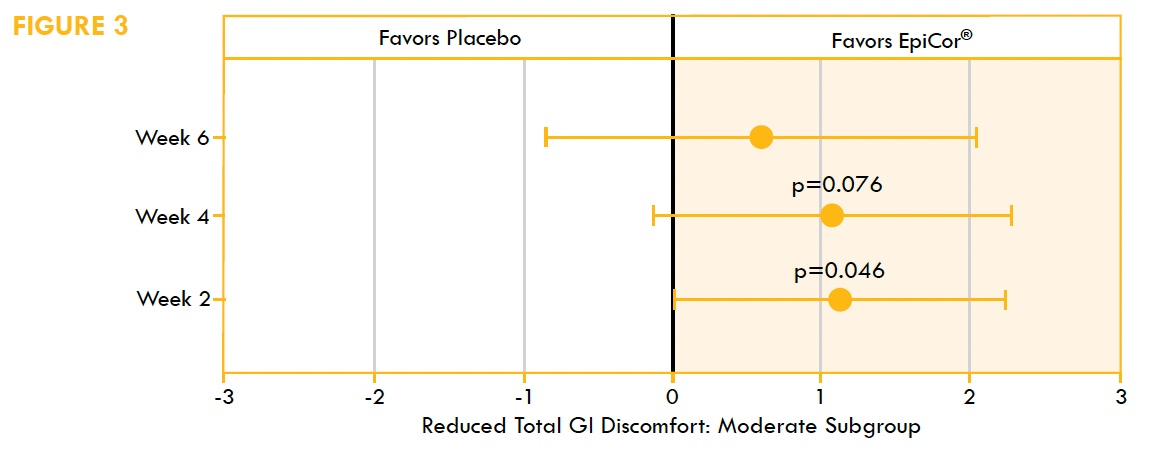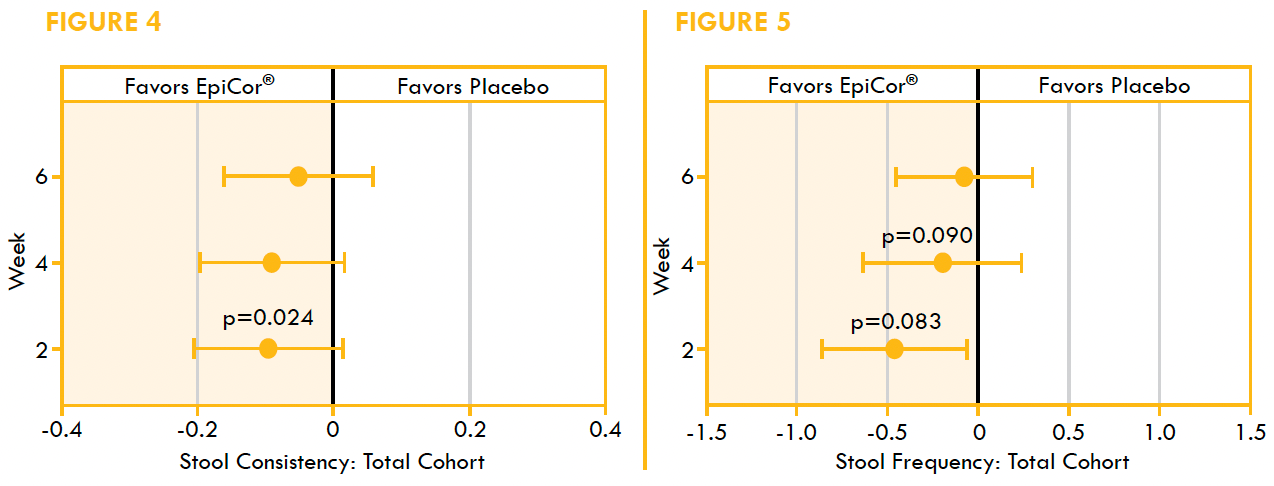The future is fermentation
EpiCor® Effects on Gastrointestinal Comfort and Gut Microbiome Levels (Published Pilot Study)
Sponsored by EpiCor Postbiotic, a Cargill brand
Photo courtesy of: Getty Images / Rasi Bhadramani
Introduction
The aim of this pilot study was to investigate long-term EpiCor® postbiotic ingestion in a population with symptoms of gastrointestinal (GI) discomfort and reduced bowel movements, and to evaluate its effect at the level of the gut microbiome.
Key Findings Include:
• Digestive discomfort significantly reduced after 2 weeks within the EpiCor® moderate subgroup (subjects that had moderate GI discomfort) vs placebo. There were no significant difference vs placebo on GI symptoms (daily total score sum of all symptoms) for the total cohort (primary outcome).
o Bloating and feeling of fullness significantly reduced after 2 and 4 weeks in the EpiCor® moderate subgroup vs placebo (p<0.05 for each case).
• Stool consistency improved significantly for the total cohort at 2 weeks vs placebo. However, there was no significant improvement in stool frequency for the total cohort or within groups.
• Gut microbiota composition (secondary outcome) changes with EpiCor® but not compared placebo. This includes:
o Anaerostipes significantly increased in total cohort within EpiCor® group but not within the placebo group.
o Bacteroides significantly increased at 3 and 6 weeks in the EpiCor® severe subgroup (subjects that had severe GI discomfort) but not within the placebo group (p<0.05 for each case).
o Firmicutes/Bacteroidetes (F/B) ratio decreased over time for EpiCor® total cohort and increased over time for placebo.
Methods

Using a double-blinded, placebo-controlled parallel design, 80 healthy subjects (13 males, 67 females, age approximately 20 – 69 years with the median about 50) with symptoms of GI discomfort and mild constipation (1 - 5 bowel movements per week) were equally allocated to one of two trial arms: daily dose of placebo (maltodextrin) or daily dose of 500 mg EpiCor® postbiotic. There was a two-week run-in phase followed by a six-week intervention phase. Randomization was done in a manner according to baseline GI discomfort severity, resulting in two subgroups of patients: severe (n=55) and moderate (n=25). Results were assayed for the total cohort as well as for the severe and moderate subgroups.
GI discomfort was measured using a diary which assayed five different symptoms on a 0 – 5 point scale: bloating/distention, gas, GI rumbling, feeling of fullness and abdominal discomfort. A “zero” rating indicated no symptom of that nature and a “five” rating indicated very severe discomfort.
Patients also tracked the frequency and consistency of stools as measured by the Bristol Stool Form Scale. This scale is comprised of seven types of stool: type 1 (separate hard lumps); type 2 (sausage shape lumpy); type 3 (sausage with cracks); type 4 (sausage but soft and smooth); type 5 (soft blobs); type 6 (fluffy and mushy); type 7 (liquid).
Qualitative changes in the microbiome of the gut were assayed using fecal samples that were collected at baseline and at three and six weeks. The general microbiota structure and profiles found in the samples were determined by 16S ribosomal DNA sequencing.
results
Within the first two weeks, the EpiCor® moderate subgroup showed rapid and statistically significant improvements for gastrointestinal health when compared to placebo. Fewer significant differences were found between groups in the four and six week averages due to a noticeable placebo effect, which seemed to increase over time especially in the severe subgroup. This pronounced placebo effect is common for gut-related trials with gastrointestinal disorders such as functional constipation. This may explain why the placebo effect was generally more pronounced in the severe group.
There were more statistically significant improvements over baseline within the EpiCor® group than within the placebo group at weeks four and six, although there were fewer significant differences when compared to placebo. This includes statistically significant improvements for stool frequency, quality of life, and perceived stress within the EpiCor® moderate subgroup but not within the placebo moderate subgroup.
Gastrointestinal discomfort questionnaire results that were statistically significant improvements for the moderate EpiCor® subgroup compared to the moderate placebo group (p<0.05 in each case):
• Bloating/distension at weeks 2 and 4 (Fig. 1).
• Feeling of fullness at weeks 2 and 4 (Fig. 2).
• Total GI discomfort at week 2 (Fig. 3).
Significant improvements were seen in stool consistency in both the EpiCor® total cohort group and the severe subgroup compared to placebo. The improvements were seen at week two, showing both a rapid and significant response to EpiCor®. Also, it should be noted that within all EpiCor® groups (total, moderate and severe) there were statistically significant improvements in stool consistency over time (p<0.05 for each) while there were no significant improvements over time in any of the three placebo groups (Fig. 4).

Nearly significant improvement (p<0.10) for stool frequency was seen in weeks two and four in the EpiCor® total cohort group as compared to placebo (Fig. 5). Also, highly significant improvements were seen within all three EpiCor® groups (total, moderate, and severe) over time (p< 0.05 for each); significant improvements over time were not seen in the placebo total cohort or subgroups.

Looking at the microbiome sequencing results, in the total cohort, Anaerostipes significantly increased within both the EpiCor® total cohort and severe subgroup (p<0.05), but not within the corresponding placebo groups. Anaerostipes is a genus recognized for its health-enhancing effects and contains acetate and lactate-consuming bacteria and butyrate-producing bacteria.
In the moderate subgroup, Akkermansia muciniphila significantly increased within the EpiCor® subgroup (p<0.05) but not compared to placebo. Akkermansia muciniphila is important for proper gut function and is inversely correlated with metabolic disorders. Also in the moderate group, Blautia and Roseburia both significantly decreased in the EpiCor® subgroup (p<0.05) but not compared to placebo. Blautia and Roseburia are believed to be higher in irritable bowel syndrome (IBS) and constipation-predominant IBS (C-IBS).
In the severe subgroup, Prevotella (Family Prevotellaceae) significantly increased in the EpiCor® subgroup (p<0.05) but not compared to placebo. A lower incidence of Prevotella species has been associated with low-fiber diets and insufficient plant-based food consumption, which is a major cause of dysbiosis in constipated patients.
Lastly, the F/B ratio decreases over time in the EpiCor® total cohort, while increasing over time for placebo. This finding was mainly due to changes seen in the severe subgroup and was not observed within the moderate subgroup. Delayed GI transit is associated with decreased Bacteroidetes numbers and concomitant increase in F/B ratio.
These findings combined with past in vitro and animal studies show that EpiCor® postbiotic has substantial gut health benefits and can support a variety of claims regarding GI discomfort symptoms and microbiome modulation. The compelling beneficial GI and microbiome results open up vast opportunities to further research how EpiCor® postbiotic works through the gut to support both digestive and immune health.
conclusion
This pilot study demonstrates emerging science that may be important to capture in a larger study designed to incorporate both acute and chronic observations of immune markers, thus solidifying the underlying mechanism of action and demonstrating the potential for EpiCor® postbiotic to sustain effects on immune health.
